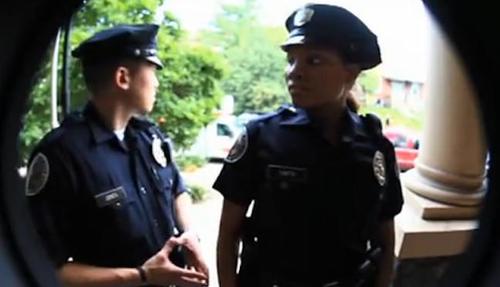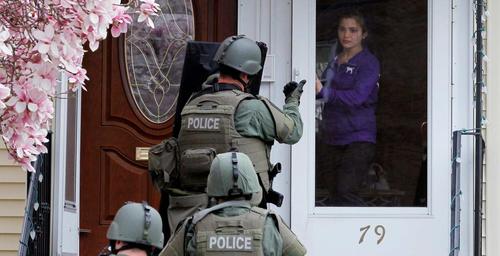By Tyler Durden
The US Supreme Court is set to rule on a Fourth Amendment case which will determine whether police or any other government official can enter one’s home with a warrant to seize guns under limited exceptions.
The Fourth Amendment protects citizens from unreasonable searches and seizures, and requires authorities obtain a search warrant supported by probable cause.
There are a few limited exceptions to this right, according to Forbes contributor Evan Gerstmann:
There is an “exigent circumstances” exception. If a police officer looks through a home’s window and sees a person about to stab another person, the officer can burst through the door to prevent the attack. There is also the “emergency aid” exception. If the officer looked through the same window and saw the resident collapsing from an apparent heart attack, the officer could run into the house to administer aid. Neither of these cases violates the Fourth Amendment and few would argue that it should be otherwise.
However, there is a broader cousin to these exceptions called the “community caretaking” exception. It derives from a case in which the police took a gun out of the trunk of an impounded vehicle without first obtaining a warrant.
The Supreme Court previously held that there is a community caretaking exception since police perform “community caretaking functions, totally divorced from the detection, investigation, or acquisition of evidence relating to the violation of a criminal statute,” and that police activity conducted under this exception don’t violate the Fourth Amendment as long as they are done in a “reasonable” manner.
Notably, the community caretaking exception isn’t limited to immediate emergencies like the first two exceptions.
All three exceptions allow for warrantless searches as long as an officer acts “reasonably,” a legal standard which is ‘significantly lower’ than “probable cause,” which is required to obtain a warrant, according to the report.
“As long as an officer might reasonably think that a warrantless search will alleviate a danger to the community, the search is considered constitutional.” -Forbes
Now, the Supreme Court has announced that it will hear arguments next month in Caniglia v. Strom, in which Mr. Caniglia was arguing with his wife, when he placed an unloaded gun on the table and told her to “shoot me now and get it over with.”
His wife called a non-emergency police line, resulting in several officers being dispatched to the residence. The police disagreed over whether Mr. Caniglia was acting “normal” or “agitated,” but he agreed to go to a local hospital for evaluation via ambulance. While en route, his wife told police that he kept two handguns in the house – prompting the officers to search his home without obtaining a warrant.

According to Forbes, Mrs. Caniglia’s consent to have the police search their home was legally negated “because the police untruthfully told her that her husband had consented to the seizure of any guns.”. Mr. Caniglia sued the police, claiming a violation of his Fourth Amendment right to privacy as well as his Second Amendment right to keep handguns in the home for self-protection.
The case has worked its way through the legal system, finally ending up at the Supreme Court:
The 1st Circuit Court of Appeals (which is the federal court just below the Supreme Court in Caniglia’s jurisdiction) sided with the police. The court wrote: “At its core, the community caretaking doctrine is designed to give police elbow room to take appropriate action when unforeseen circumstances present some transient hazard that requires immediate attention. Understanding the core purpose of the doctrine leads inexorably to the conclusion that it should not be limited to the motor vehicle context. Threats to individual and community safety are not confined to the highways.”
It is certainly true that the police need a good deal of discretion in carrying out their varied, complex, and sometimes dangerous duties. But they are also powerful agents of the government and their power is supposed to be restrained by the Bill of Rights. The Fourth Amendment is supposed to protect the home above all other places. And whatever one’s views on gun control may be, the Supreme Court has clearly held that the right to keep handguns in the home is at the core of the Second Amendment. -Forbes
Gerstmann makes a great point – that unlike “exigent circumstances” and “emergency aid” exceptions, the “community caretaking” exemption is not limited to time-sensitive circumstances where there is no time to apply for a warrant.
“The question of what sort of caretaking falls under this exception is extremely vague. Will the police be able to use it, for example, to conduct warrantless searches of political protesters’ homes to make sure they aren’t planning on violent behavior at their next political rally?”






Wow! This is disturbing! I can foresee abuse of this doctrine…